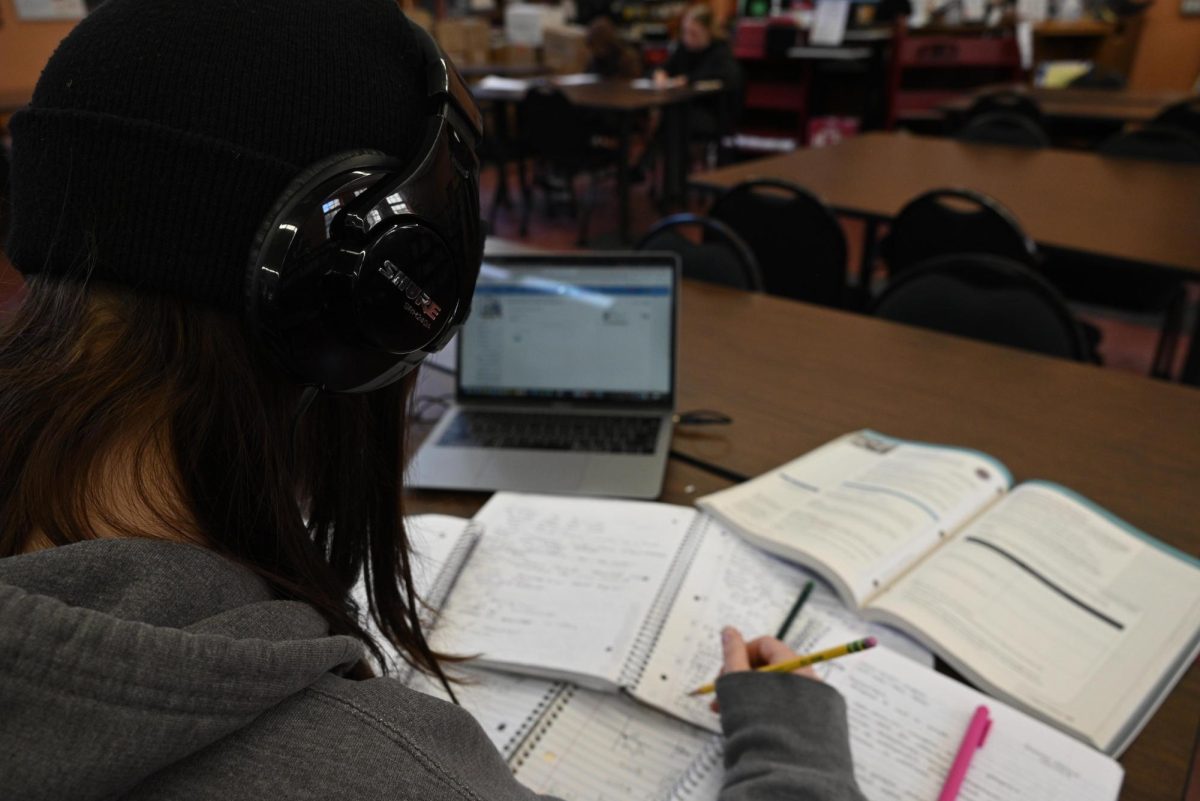With an AP Calculus textbook propped on his desk, junior Julian Pankowski fights to keep his eyes open as he studies. Balancing four-hour-long rehearsals for the school musical and seven academic courses, Pankowski often finds himself working until late in the night.
During starlit studying sessions, he continuously trudges past midnight, and the hours only continue to multiply.
Sitting in silence, Pankowski continues to read and eventually finds himself reading the same sentence over and over again. The silence of his bedroom becomes deafening until he falls asleep at three a.m., drooling over his textbook.
With the increasing popularity of music sites and personalized playlists, some students are finding that music helps them focus when studying. According to the New York Post’s 2022 article, roughly 55% of students listen to music while studying, with roughly 25% of those students choosing classical or instrumental tracks.
However, Pankowski argues that listening to music while studying is distracting, and most adults would agree.
“When I listen to music, specifically music with lyrics, all I can focus on is the music,” he said. “I love the lyrics in songs more than the actual song itself, so I find myself listening and singing along to the music rather than doing my work. Eventually, it becomes too distracting and I realize that I’ve been singing Joni Mitchell for half an hour instead of doing a history assignment that was due two weeks ago.”
Yet, studies have shown that music produces several positive effects on the human body and brain. Music activates both the left and right brain at the same time, and the activation of both hemispheres can maximize learning, improving both memory and focus.
Rather than distracting students, a 2007 Stanford study found that music moves the brain to pay attention. Researchers utilized musical compositions from the 1800s in their study and found that music engages the areas of the brain involved with paying attention, making predictions and updating memory.
Freshman Amelia Probst believes that music is her driving force. Without it, she would never get anything done.
“Music removes the noises and distractions surrounding me,” she said. “If I ever work in silence, or worse, with noises from other people and objects, I’m going to notice the smallest distractions. Whereas if I have music playing, there’s already a part of my brain being occupied so that I don’t look around and get distracted.”
While Probst listens to various genres of music while studying, she finds that slower songs keep her focused longer.
“I listen to slower music because I find that if it’s too loud or if it’s too upbeat, it’s going to distract me more than normal noise in the world would,” she said. “So anything slow-paced is great.”
She is weary of her one weakness: musical theater.
“I am a theater kid, so if I do listen to musical theater songs I will get so into it that I’ll start lip-synching and doing my own one-woman show at my desk,” she said.
A 2014 study conducted by Cambridge University shows that hip-hop music provides an uplifting effect on its listeners that can help them accept, manage and better deal with mental health issues. Meanwhile, classical music composed by Mozart, Bach or Beethoven can help students categorize information, which is an influential asset for studying.
The brain looks for patterns to better understand, recall and process information. Some researchers even suggest that the benefits don’t necessarily depend on the kind of music a person listens to, but rather on how effectively their brain latches on to the pattern of the song.
Choir teacher Mr. Shawn Wilson explains that people who engage with music have key advantages that others do not.
“Performing music works your brain harder than most academic activities because you have to do multiple skills simultaneously,” he said. “It changes the way your brain works. Think of people in your life who play piano regularly or take music lessons, not a single one of them is dumb. Lazy? Unmotivated? Maybe. But not dumb.”
According to Mr. Wilson, this is because the brain’s mastery of music is an incredibly intense process.
“Being successful at music requires so many problem-solving skills that happen in real-time and under pressure that a regular academic environment doesn’t provide,” he said.
Musical activity serves as a cognitive exercise for the brain and trains it for more challenges in the future. Therefore, people who have musical training early on, specifically before age seven, have healthier brains and are less likely to suffer from diseases like Alzheimer’s or dementia.
But you don’t have to wait for old age to begin benefitting from music. You can start exercising your brain now, simply by having a device and headphones handy during study sessions.
For students who struggle with studying, Mr. Wilson recommends that they continue trying while keeping their brains stimulated using various genres of music.
“The thought process that classical music is king and key to learning and focus is outdated,” he said. “It’s not that it isn’t true, it’s just that all music is going to affect all people in different ways. Cycle through different playlists that people curate and notice the effect it has on the amount of work you get done. The best way to explore the benefits of music is to get curious.”



